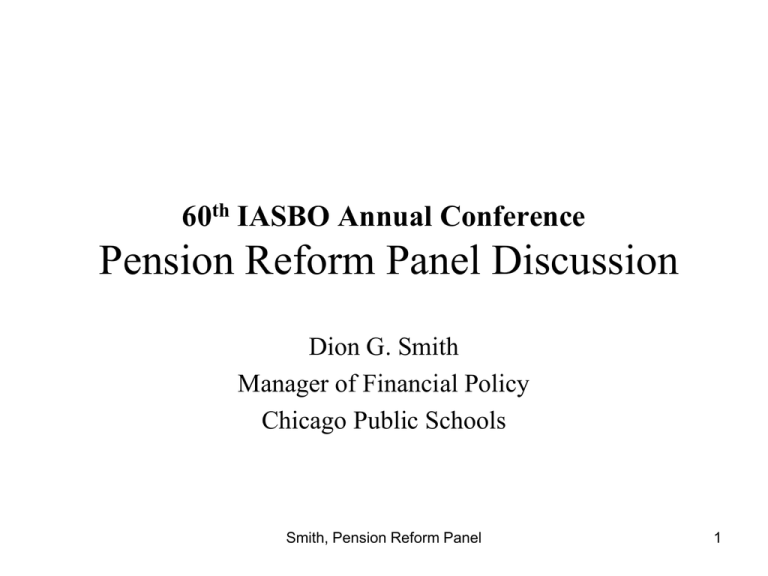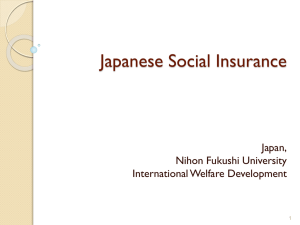Pension Reform
advertisement

60th IASBO Annual Conference Pension Reform Panel Discussion Dion G. Smith Manager of Financial Policy Chicago Public Schools Smith, Pension Reform Panel 1 Introduction • Those who attended this panel discussion last year may recall that we discussed Senate Bill 1946/Public Act 96-0889, which created a second tier of public pension benefits for new participants in TRS and IMRF, and most other new public employees in Illinois. • Today’s panelists will discuss developments in pension reform since last Spring, in the new 97th General Assembly. Smith, Pension Reform Panel 2 State Constitutional Issues • But first I want to spend a few minutes discussing State constitutional issues. • Any opinions expressed during my remarks are my own, and not those of the Chicago Public Schools or the Chicago Board of Education. • Finally, please hold questions until all presentations are finished. Smith, Pension Reform Panel 3 Illinois Constitution (1970) • Article XIII, General Provisions, Section 5: – “Membership in any pension or retirement system of the State, any unit of local government or school district, or any agency or instrumentality thereof, shall be an enforceable contractual relationship, the benefits of which shall not be diminished or impaired.” • Article I, Bill of Rights, Section 16: – “No … law impairing the obligation of contracts … shall be passed.” Smith, Pension Reform Panel 4 Illinois Supreme Court Decisions • Several State Supreme Court opinions have interpreted the Pension Protection Clause: – People ex rel. IFT, etc. v. Lindberg (1975) – McNamee v. State of Illinois (1996) – People ex rel. Sklodowski v. State of Illinois (1998). • But none of these cases specifically considered whether or not the future, un-earned pension benefits of current employees are protected. Smith, Pension Reform Panel 5 New Legal Opinion From Illinois Senate • Earlier this year, the Counsel to the State Senate President issued a lengthy written opinion, in which he argued that reducing the future pension benefits of current public employees was unconstitutional. • In addition, he concluded that the General Assembly could not require current employees to contribute more to support their future pensions. Smith, Pension Reform Panel 6 But CTA Pension Reform Act? • However, if the Senate legal opinion is correct, then Public Act 95-0708 is unconstitutional: – In 2008, a sweeping CTA reform package became law; – The retirement provisions of that law required, among other reforms, current CTA employees to contribute more to support their pension benefits (see 40 ILCS 5/22-101). Smith, Pension Reform Panel 7 For Further Reading • Illinois General Assembly’s website for: State Constitution, Public Acts, Statutes, Bills, etc. (see http://www.ilga.gov). • Illinois Commission on Government Forecasting & Accountability, The Handbook of Illinois Pension Case Law (see http://www.ilga.gov/commission/cgfa2006/Home.aspx). • Madiar, Is Welching on Public Pension Promises an Option for Illinois? (see http://www.illinoissenatedemocrats.com/images/pensions/D/P ension%20Clause%20Article%20Final.pdf). Smith, Pension Reform Panel 8





